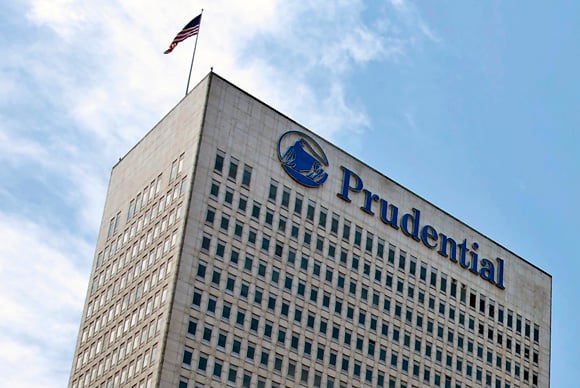Prudential Financial Inc. (PRU), the second-largest U.S. life insurer, is in the last stage of a regulatory review that may impose extra oversight because its central role could endanger the economy if the firm ever collapsed.
The Financial Stability Oversight Council voted to advance Newark, New Jersey-based Prudential to a third round of evaluation, which could tag the company as systemically important, two people with knowledge of the matter said. They asked for anonymity because the process is confidential. Firms in that category could see dividends and buybacks curbed as regulators try to head off a repeat of the 2008 crisis that almost destroyed the banking system.
“There's a concern that they won't be able to return capital to shareholders in the way that they've been accustomed to,” Sean Dargan, an analyst at Macquarie Group Ltd., said in an interview before the council's decision. “They will have to submit capital plans of some sort to the Fed.”
The council, led by Treasury Secretary Timothy F. Geithner, is evaluating which companies must submit to Federal Reserve supervision, including stress tests and tougher standards for capital and liquidity. The U.S. spent, lent or committed as much as $12.8 trillion to bolster financial firms and automakers amid the financial crisis.
Company Status
Prudential, led by Chief Executive Officer John Strangfeld, 58, fell 3.7 percent to $57.70 at 11:51 a.m. in New York and earlier tumbled as much as 3.9 percent, the most intraday since July. MetLife (MET) Inc., the largest U.S. life insurer, dropped 3.7 percent to $35.74.
A Treasury Department spokeswoman declined to comment today and referred to a statement yesterday that said the council won't announce the name of any nonbank financial company that's under evaluation before a decision is final. Bob DeFillippo, a spokesman for Prudential, declined to comment on whether the insurer is in the final review stage.
“We're continuing our ongoing discussions with regulators as we have from the very beginning to help them understand that insurance companies shouldn't be regulated like banks,” he said. Prudential previously has said it meets the council's quantitative thresholds for further evaluation.
American International Group Inc. (AIG), once the world's largest insurer, and General Electric Co. (GE)'s finance arm have also entered the final stage of review. The council can still advance other companies to the last round.
Shareholder Payout
AIG, which received a U.S. bailout that swelled to $182.3 billion amid the financial crisis, disclosed its FSOC status on Oct. 2. The New York-based insurer has said it's preparing to be regulated by the Fed and isn't concerned about the effect on its main businesses.
The designation may limit AIG's ability to repurchase shares or pay a dividend, Meyer Shields, an analyst at
Stifel Nicolaus & Co., wrote in an Oct. 2 research note.
Prudential and New York-based MetLife were among the largest financial firms in the U.S. to avoid a bailout, and have questioned the need for increased oversight. Insurers are mostly regulated by states.
The two companies have said that bank rules are not a good fit for life insurers, which often retain policyholder funds for decades before paying benefits and may be less vulnerable to client withdrawals.
MetLife is already regulated by the Fed because it owns a bank, and the insurer is seeking to exit banking to end the oversight, which has blocked share buybacks and a dividend increase.
The oversight council was created in the aftermath of the crisis under the Dodd-Frank law and evaluates leverage and derivative liabilities of firms with more than $50 billion in assets. A company under consideration as a SIFI, or systemically important financial institution, can challenge the notice within 30 days. The council would still have to vote at a future meeting to officially designate the companies.
--Bloomberg News--







